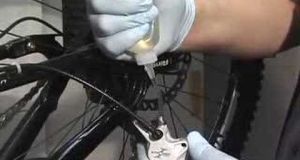For the most part, brake cables and hoses come in the same diameter all across the market. That's anywhere from 1.1mm to 1.6mm. It's debated if extra bulk of the cord makes any difference.

Mechanical brakes are called Bowden cables. There's a nylon, rubber, or plastic coating around a protective, flexible steel housing. Within the steel housing is an inner wire of tightly-spun steel lined with nylon fabric for lubrication. At the end of the cable are metal stops to which it is stopped by the brake lever. They run through hollow bolts (called barrel adjusters) that adjust tension of the Bowden cable by loosening or tightening the bolt. Squeezing the lever pulls the cable tighter through the housing simultaneously pulling the brake closed. The outer wire is spiraled (like a slinky) and allows for more dispersed elongation or compression when the brake is applied. This evenly spreads out the heavy load when power is applied for braking, and keeps from snapping the cable.

Hydraulic brakes lines are a bit different.The inner wire is a Teflon hose containing DOT brake fluid or mineral oil. Housing that is a protective wire of Kevlar and nylon to help shield from abrasions or rubbing on the frame. The line is attached to the brake lever (master cylinder) in either open or closed systems. The lever drives a piston that compresses the fluid in the hose. They are actuated in 3 strokes:
- Dead stroke: The master cylinder (the brake lever) pushes the fluid together at the other end of the hose, essentially pulling the slack out.
- Pad gap stroke: As you might guess, this stroke is when the fluid pushes the pistons, and therefore the brake pads, against the caliper.
- Contact and modulation stroke: Ever-increasing pressure is applied to the pads by the hydraulic fluid - which is specially designed not to compress.
Hydraulic brakes are closed from the elements, meaning they will last much longer. However, if the ambient temperature exceeds the boiling point of the fluid, it could expand in the brake line and damage seals on either end. If the hose leaks the hydraulic fluid, the brakes will not function.




